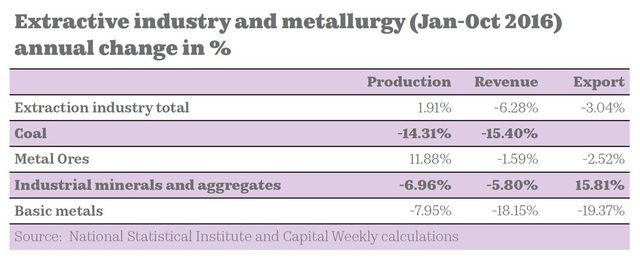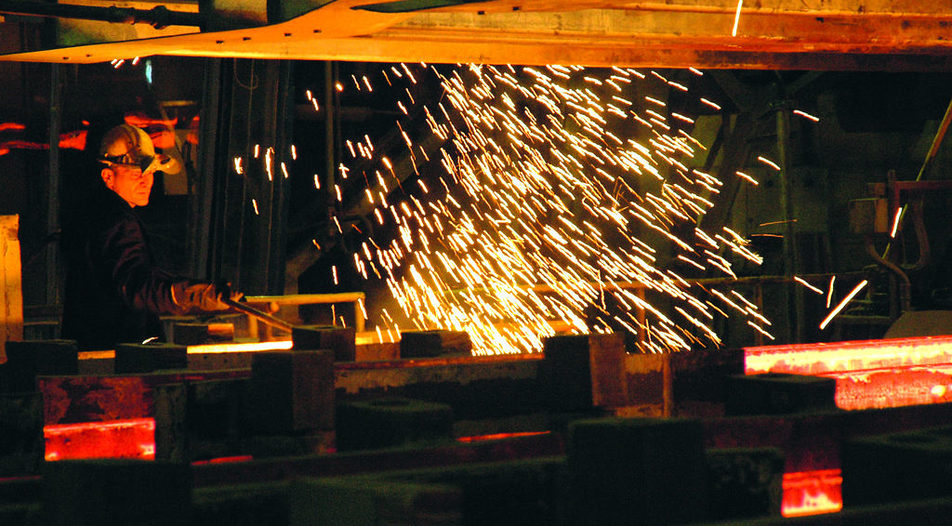For the first time in eight years, steel production in Bulgaria is posed to have seen some growth in 2016. The good news is that the trend, however feeble, is expected to continue this year. Given the stable performance of the non-ferrous metal production sector, which managed to emerge from the crisis much earlier, the prospects of the metallurgical industry are quite positive as a whole.
Good direction
The steel business in Europe in general is expected to have a good year in 2017 thanks to the restrictions imposed by the European Commission on some imports from China.
"That will definitely give an impetus to European manufacturers, who are now protected against the unfair competition of dumping prices. That is why the steel production sector in Bulgaria, which is actually Pernik-based Stomana Industry, is optimistic. We believe 2017 will be much better than the past crisis years," said Anton Petrov, representative of Greece's Viohalco (owner of Stomana Industry) and chairman of the Bulgarian Association of the Metallurgical Industry (BAMI). In his words, the growth can already be felt. "The trend was evident in 2016, especially in the last two quarters. Of course, the increase is modest but it is a good direction," Petrov said.
BAMI's executive director Politimi Paunova believes that the lack of a significant rise in steel product consumption in Europe still limits steel production. "Eurofer expects that demand will increase between 1.0 and 1.5 percent in 2017 but this is close to the statistical error," she said. "We cannot yet say that the European industry has really kicked off the bottom it reached during the crisis and that directly affects steel consumption."
Steel production capacities in Bulgaria are still not fully loaded. The total capacity of Stomana Industry and Promet Steel (which processes semi-finished products) amounts to nearly 1.8 million tons annually. At the same time the output does not top 700,000 tons. In Paunova's words, the further increase in ferrous metal production will also depend on the business environment in Bulgaria. "That means there should be no rapid changes in business-related regulations, including those on energy resources," she explained.
Stable market positions
The non-ferrous metallurgy is on a much safer ground, with plants actually working at full capacity. "The higher prices of non-ferrous metals allow them to be traded around the world, not just in Europe. The companies have stable market positions and will maintain their good levels," Paunova said.
Plovdiv-based lead-and-zinc smelter KCM projects relatively high metal prices but a limited increase in consumption. "Our response is that we preserve the level of production from 2016, i.e. some 70,000 tons of lead and 74,000 tons of zinc," KCM Group CEO Rumen Tsonev said.
Copper producer Aurubis Bulgaria is expected to return to full capacity in 2017 following last year's reduced production due to a planned shutdown that continued for nearly two months. The financial report of Aurubis' German owner shows that in the year ended September 30 the plant in the town of Pirdop processed 200,000 tons less concentrate (a total of 1 million tons), while cathode production shrank to 214,000 tons from 232,000 tons a year earlier. That reduced the company's profit by nearly a third to €61.2 million.
Investment
A more substantial rise in aluminum output volumes at Alcomet can be expected next year, when the company will complete a two-year investment program. In 2016 the Shumen-based aluminum product manufacturer embarked on a €36 million project, which will increase its capacity 35% to 100,000 tons a year. The investment is intended to allow the plant to manufacture higher-value-added products. That will increase the company's turnover by 50% to €256 million once the program is completed.
On the whole, the projections for metal product manufacturers are positive.
"Enterprises like Alcomet, Etem and Sofia Med expect to improve their results in 2017," Petrov said. In his words, investments in the sector of some €51 to €77 million a year are a matter of course.

Iglika Philipova is editor with Capital Weekly
For the first time in eight years, steel production in Bulgaria is posed to have seen some growth in 2016. The good news is that the trend, however feeble, is expected to continue this year. Given the stable performance of the non-ferrous metal production sector, which managed to emerge from the crisis much earlier, the prospects of the metallurgical industry are quite positive as a whole.












